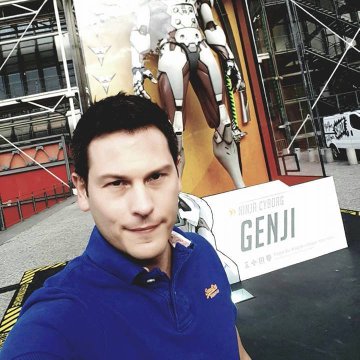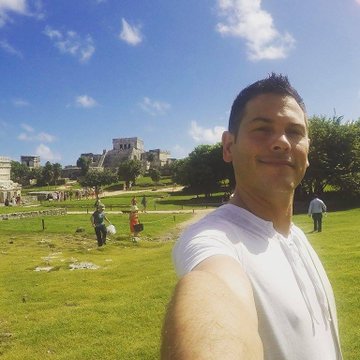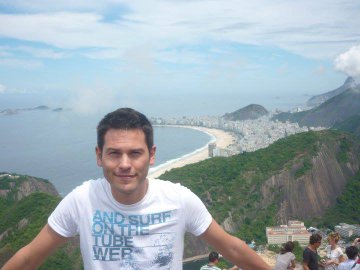How one man created a fake Facebook celebrity and fooled an entire nation
/https%3A%2F%2Fblueprint-api-production.s3.amazonaws.com%2Fuploads%2Fcard%2Fimage%2F685563%2Fd16e5287-aede-4398-a587-8997c5ccfc6e.jpg)
IMAGE: VICKY LETA/MASHABLE
This is the story of Dr. Jekyll and Mr. Hyde, but in the world of social media and fake news.
Have you met every single friend you have on Facebook in real life? We all know the basic rules about keeping photos and posts private and carefully vetting friend requests.
But things can get complicated. And dangerous.
I met the real Alexandre Martinez on Facebook over the summer. He lives in France and has short dark hair and chiseled features.
Those features are now highly recognizable in Bulgaria, where Alexandre, better known as Alexander Nikolov, became an unwitting celebrity.
Alexandre fell victim to an incredibly intricate case of identity theft. His name, photographs and personal information were used to create a multitude of fake social media accounts. This continued for over five years when a Bulgarian man was jailed for using the fabricated identity to scam people.
Not long after that, the fake Facebook profile, gleaming with Martinez's photos, was taken over by Bulgarian authorities, who announced it by putting a logo on the profile picture and a banner on the cover image.
It read, "This profile has been taken over by the Division for Organised Crime for its criminal use, in accordance with the Criminal Code of the Republic of Bulgaria."
The surreal sight is exacerbated by the photos belonging to Alexandre Martinez still visible on the bottom left.
The account has since been taken offline.
IMAGE: SCREENSHOT BY MASHABLE
More than two dozen people I spoke with had willingly given large sums of money and shared personal details between 2015-2017 with a man they were convinced was real. They had been interacting with his statuses and his pictures for years. They felt like they knew Alexander Nikolov.
I, too, had been friends with that fake account for years, interacting with someone hiding behind a social media mask all along.
Meanwhile, fake Alex had established himself as a social media star in his own right, garnering a sizable online following, including journalists, politicians and public figures. Over time, this helped him pen countless articles in various news outlets. He would even dial in as a political commentator on national TV news programs and radio shows.
And yet, no one in Bulgaria had ever seen this man in real life.
"It was a total shock to me and my family. I can't believe my photos were used to scam people," Martinez said.
IMAGE: GIF BY MASHABLE
The tale of Alexandre Martinez shines a different light into the increasingly familiar story about the infiltration of fake accounts, or bots, on social media networks to be used as political weapons or tools for profit.
This is about the dangers of real people creating fake accounts and about the ease with which fake accounts can accrue an incredibly authentic digital footprint that can be used to deceive, scam and harm people. And, whereas bots are increasingly easy to spot, these fake accounts were so well crafted and detailed, there was virtually no way to recognise, flag, or track them.
Until the man allegedly behind it all got caught. For a long time, his authenticity was unquestionable. Then it all came crumbling down.
Being Alexander Nikolov
IMAGE: VICKY LETA/MASHABLE
I spent the last few months investigating fake Alex. I wanted to find out how hard it would be to track down both the perpetrator and the victim. I also wanted to see how much support social media platforms offer in cases of stolen identity.
The man allegedly behind the fake Alex accounts is called Spas Vasilev. His online existence can be traced back to Twitter where he used the handle @tourbg. Some of his first tweets are from 2012. In 2013, a Facebook profile popped up with the name Alexander Nikolov. From there, his social media accounts skyrocketed in popularity in Bulgaria, according to multiple people who first followed him on Twitter and then befriended him on Facebook.
In the years that followed, Vasilev would download pictures that Alexandre Martinez was posting on his private social media accounts, patiently concocting a glamorous new life for fake Alex and his engaged audience in Bulgaria. In this life, fake Alex was landing top jobs at multinational corporations and consultancy firms – most notably Airbus. He lived in Paris and New York with his wife and kids, who were also fictitious.
As he tagged fake Alex's travels across the world on Facebook, Vasilev was living a solitary and secluded life in Bulgaria.
Vasilev's story involves money, too. Vasilev, under the false pretense of being a rich and successful manager with connections in various airlines, allegedly began offering discounted flights to dozens of people through Facebook. Many people trusted him, dozens more I spoke with even secured flights.
One person flew to Bulgaria, then to San Francisco with tickets purchased via fake Alex. The tickets were real, albeit last-minute. But on his third attempt – two tickets to New York – the fake Alex accounts went silent.
There was no flight to New York.
For years, it seemed to be working perfectly. Then I was invited to a secret Facebook group, made up of dozens of people (73 at the time of writing), who claim to have fallen victim to Vasilev's schemes. (Full disclosure: I was added by a friend, who had shared sensitive personal information with Vasilev. She had come to know the fake Alex Facebook account through me.)
So I tracked the alleged perpetrator down with the help of Henk van Ess, a researcher and contributor for Bellingcat.
From emails used by fake Alex, provided by people in the Facebook group, we found another name, besides Alexander Nikolov, used to register those addresses – Aneliya Stoyanova. A deep search into Alexander Nikolov's profile showed several mentions of the name Aneliya in comments to posts dating back to 2010.
IMAGE: SCREENSHOT BY MASHABLE
In addition, two of the phone numbers associated with fake Alex led to two new Facebook accounts with supposed French identities (Guillaume Martin and Claire Berranger). A deeper look revealed several other connections with the fake Alex profile – all three were listed as administrators of a Facebook page for a media company set up by Vasilev. These fake accounts, most likely also created by Vasilev, remain online.
Next, I tracked down the alleged perpetrator, Spas Vasilev. Fake Alex claimed to have lived in Paris, which was also cited as his hometown on his Skype profile. The two other fake accounts set up by Vasilev were also located in France. And I had received another lead from the secret Facebook group by someone who claimed to have studied with Vasilev in Nice, France, in 2004.
That led me to an account on an old Bulgarian social media network, belonging to a man called Spas Vasilev, whose profile states he completed an undergraduate degree at the School of Economics and Business in Nice. It had his full name and correct date of birth. From there, using official records, I found his address and his family.
IMAGE: SCREENSHOT BY MASHABLE
So, I had a lead about the alleged perpetrator, but zero clues about who the man on all the fake Alex pictures was. On Oct. 7, 2017, I made a public request for help on Twitter.
Within days after my tweet, it was the leading story in Bulgaria, with all major news networks, newspapers and tabloids filing their own stories.
A few days after that, Spas Vasilev was arrested.
The stolen identity
When I told Alexandre Martinez about his new found fame in Bulgaria, he told me it was like seeing a ghost. How could someone have been using photos of his private life to create an entirely new person online and use it to fool an entire nation?
I located Martinez's real LinkedIn profile first, then Facebook – which is where I interviewed him. He doesn't recall ever meeting Vasilev. Yet, he confirmed that the pictures on the fake Alex account were his, the oldest dating back a few years, the newest from aboard the first Boeing 787 flight for Air France on Jan. 5, 2017.
Because Martinez's Facebook account and photos aren't public, "and never were," he remains unsure how Vasilev had gained access to them.
Martinez told me having his identity stolen had caused great distress to him and his family and he was worried Vasilev's ticket scams would cause problems for him at work.
The dangers and repercussions of online identity theft are far-reaching. And social media companies don't make it easy to track and report abuses and, most importantly, notify the people whose personal data had been stolen.
In Bulgaria, online identity theft is not a crime, according to the law.
One of the prosecutors working on Vasilev's case, Ivaylo Petrov, said the focus was solely on traceable financial dealings Vasilev had while pretending to be Alexander Nikolov.
Millie Graham Wood, a solicitor with Privacy International, said this is often part of a larger problem:
"In instances where there is identity theft, society and governments need to consider how to respond to this, particularly where individuals use photos to signify trustworthiness (e.g. that they are a professional working for a large airline) and use this to create fake personas and exploit other individuals financially," Wood said.
"This is a complex area and requires companies who encourage us to post our daily lives on social media to think critically about how social media is not only used as a surveillance tool, but can be used for identify theft."
Facebook and LinkedIn did not respond to requests for comment. I also alerted staff at Air France about a potential identity theft of one of their potential employees, citing the geolocated photos from the maiden Boeing 787 flight. Air France responded by saying they would address the matter, but were not at liberty to release any further information.
As it turns out, they never contacted Martinez about it either.
A playbook for creating a fake account
Fake Alex and I first connected on Twitter, then Facebook, where we had 34 mutual friends.
I know his voice because we've spoken on the phone on several occasions. The first record I have of him trying to sell me flight tickets is from Sept. 26, 2016.
IMAGE: SCREENSHOT BY MASHABLE
But there is a sharp distinction between fake Alex – the discount ticket scammer and Alexander Nikolov – world traveller, journalist and social media influencer.
I can't help but wonder if that account would still be online today if it weren't for the scams?
Due diligence
Before this story broke in Bulgaria, a Google search revealed pages and pages of articles with Alexander Nikolov's bylines. In the aftermath, news agencies jumped to cover the flashy case of a stolen identity.
What remains troubling is the hidden attempts of some outlets to cover up how little vetting they all did in their dealings with fake Alex.
A good example is a broadcast by the Bulgarian National TV from 2014, where fake Alex was scheduled to appear via Skype. Fake Alex phoned in citing technical issues, according to the reporter that conducted the interview.
Vasilev also penned op-eds in other media outlets under the guise of fake Alex. He was a regular contributor to Webcafe until 2017. However, after I contacted the owners of the website about how they verified him before working together, his bylines were removed immediately and replaced by what now reads "Become a contributing writer." (A blog he was editing and writing for was subsequently bought by the Webcafe group.)
Alexander Nikolov ceased to exist on Facebook on Jan. 11, 2018, the last time I was able to access it. But he lives on on LinkedIn. All the while, the man allegedly behind this remains in custody in Bulgaria awaiting charges, none of which are related to his elaborate and long-term identity theft.
Fake Alex was born using snippets of someone else's life and an entire nation was duped. His Facebook profile prospered because it used the platform exactly as it was designed. But the consequences are very real – from the difficulty of tracking down the perpetrator and holding them to the task of erasing the stolen content off the internet.
COMMENT and SHARE
















Comments
Post a Comment